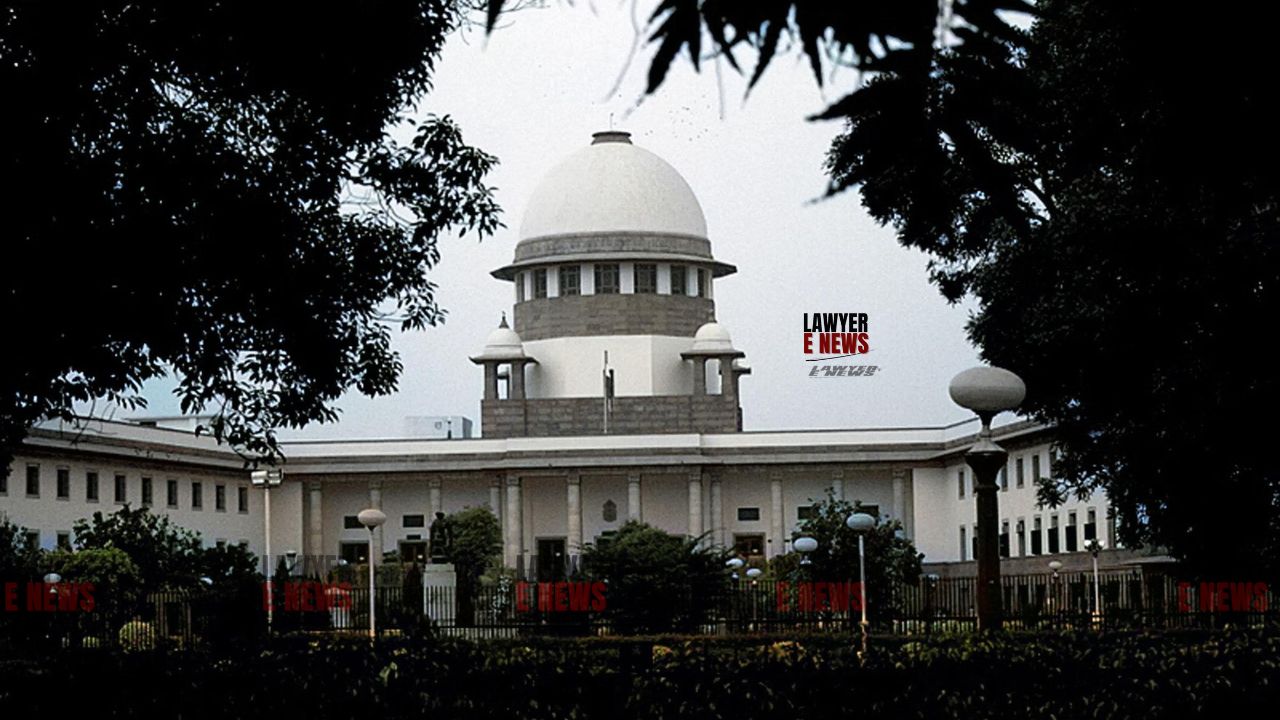-
by Admin
15 February 2026 5:35 AM



A Compromise Decree That Recognizes Pre-Existing Rights Is Not Chargeable with Stamp Duty - Supreme Court. The Court held that a compromise decree asserting pre-existing rights over immovable property does not require registration under Section 17(2)(vi) of the Registration Act, 1908, nor is it liable for stamp duty under Section 3 of the Indian Stamp Act, 1899.
The Court quashed the Madhya Pradesh High Court’s order, which had upheld a Collector’s determination requiring the appellant to pay ₹6,67,500 in stamp duty. The judgment reaffirms the principle that compromise decrees recognizing pre-existing rights are exempt from both registration and stamp duty.
The appellant, Mukesh, filed a civil suit in 2013 seeking declaration of ownership and permanent injunction over a parcel of agricultural land, claiming continuous possession. During the suit, a compromise was reached with Respondent No. 2, the adjacent landowner, resulting in a decree dated November 30, 2013. The decree recognized Mukesh's ownership and restrained the respondent from interfering with his possession.
Subsequently, Mukesh applied for mutation of revenue records in his favor. However, the Tehsildar referred the case to the Collector of Stamps, who imposed a stamp duty of ₹6,67,500 under Article 22 of Schedule IA of the Indian Stamp Act, 1899. The decision was upheld by the Board of Revenue and later affirmed by the Madhya Pradesh High Court. Aggrieved, the appellant approached the Supreme Court.
Does a compromise decree recognizing pre-existing rights require registration under Section 17(2)(vi) of the Registration Act, 1908?
Is stamp duty applicable on a compromise decree that asserts pre-existing rights over immovable property?
Does the Collector have the authority to impose stamp duty under such circumstances?
The Court analyzed Section 17(2)(vi) of the Registration Act, 1908, which exempts decrees from mandatory registration when they do not create new rights but instead affirm pre-existing rights. The Court held that the compromise decree merely recognized the appellant's long-standing possession and title, thereby falling within the exemption.
“The compromise decree did not create any new right, title, or interest but merely affirmed the appellant's pre-existing rights. It, therefore, does not require registration under Section 17(2)(vi) of the Registration Act, 1908.”
The Court distinguished this case from Bhoop Singh v. Ram Singh Major (1995), where registration was mandated for decrees creating new rights.
The Court referred to Section 3 of the Indian Stamp Act, 1899, which outlines instruments chargeable with stamp duty. It clarified that court orders or decrees are not chargeable unless explicitly mentioned in Schedule I or IA of the Act.
“A compromise decree that merely affirms pre-existing rights does not fall under the category of ‘conveyance’ under Article 22 of Schedule IA of the Indian Stamp Act. Consequently, no stamp duty is chargeable.”
The Court emphasized that since the compromise decree in this case did not transfer or create new rights, the Collector's determination of stamp duty was erroneous.
The Court relied on the landmark judgment in Ravinder Kaur Grewal v. Manjit Kaur (2019), which held that adverse possession confers a possessory title that can be used as a "sword" in declaratory suits. It found that the appellant’s long-standing possession over the disputed land established a pre-existing right.
“Continuous and uninterrupted adverse possession can confer title, which can be asserted through declaratory suits. The appellant's possession over the subject land, as recognized by the compromise decree, validated his pre-existing rights.”
Respondent No. 1, the State, alleged collusion between the appellant and Respondent No. 2 to evade stamp duty. The Court dismissed these allegations, noting the absence of any evidence.
“Allegations of collusion require concrete proof. In the absence of any finding or challenge to the compromise decree, such claims cannot be sustained.”
The Court further noted that the State had not challenged the compromise decree in any court, allowing it to attain finality.
Judgment and Directions
Registration Exempted: The Court ruled that the compromise decree did not require registration under Section 17(2)(vi) of the Registration Act, 1908.
Stamp Duty Not Applicable: The Court quashed the Collector’s determination of ₹6,67,500 as stamp duty under Article 22 of Schedule IA of the Indian Stamp Act, 1899.
Mutation Directed: The Court directed the revenue authorities to update the records to reflect the appellant’s ownership of the subject land.
“The impugned order passed by the High Court, upholding the Collector’s determination of stamp duty, has no legs to stand. The authorities concerned shall carry out the mutation in favor of the appellant without any demand for registration or stamp duty.”
Significance of the Judgment
Clarifies Exemption for Compromise Decrees: The judgment reaffirms that compromise decrees recognizing pre-existing rights are exempt from both registration and stamp duty.
Protects Property Owners Asserting Adverse Possession: By relying on Ravinder Kaur Grewal (2019), the Court strengthened the principle that adverse possession can confer title usable as both a sword and a shield.
Prevents Revenue Overreach: The ruling curtails the misuse of stamp duty provisions to impose unwarranted financial burdens on litigants asserting legitimate claims.
Emphasizes Evidentiary Standards for Collusion Allegations: The Court underlined the need for concrete evidence to substantiate allegations of collusion in compromise decrees.
The Supreme Court’s judgment in Mukesh v. State of Madhya Pradesh is a landmark ruling affirming the legal sanctity of compromise decrees recognizing pre-existing rights. By exempting such decrees from registration and stamp duty, the Court not only upheld the appellant’s property rights but also reinforced the principles of equity and legal clarity in property disputes.
Date of Decision: December 20, 2024
